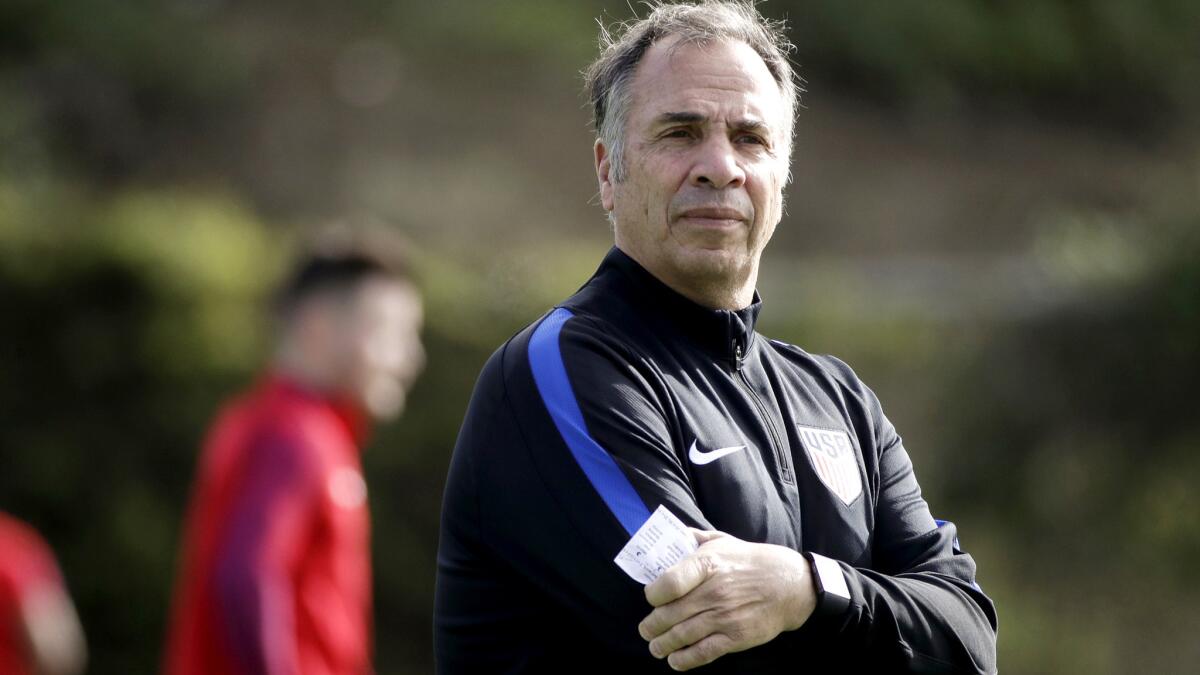Column: Bruce Arena reaching for the moon with call for a World Cup title in 2026

Bruce Arena believes the U.S. will be doing more than just hosting the World Cup in 2026. In nine years, Arena says, the country could also be competing to win soccer’s biggest prize.
“I think 2026 will be the time where we are going to start talking about winning a World Cup,” he said.
Stranger things have happened in shorter periods. It was eight years between President Kennedy committing to put a man on the moon and the Eagle landing at Tranquility Base. Winning a World Cup should be a piece of cake compared to that.
Arena didn’t get into specifics of how that would happen, but then big-picture guys rarely do. Their job is to set the goal and provide the inspiration. It’s up to others to work out the details.
“Think about where we are going to be in nine more years,” Arena said. “Think about where we were in 1994, ’98. Keep going and think about where we will be with eight or nine more years in our league, eight or nine more years of players developing all over the world and then playing the World Cup in our country.
“I think we are going to be positioned to be a big player in 2026.”
There’s a lot of work to do between now and then. Before the U.S. can think about winning the World Cup in 2026, it has to qualify for the tournament in 2018 and 2022. And Arena’s team still faces an uphill climb to reach next year’s event in Russia, standing fourth in the six-team CONCACAF qualifying tournament with six games to go.
Only the top three countries advance automatically, and failing to do so would deal a serious blow to the momentum the U.S. has created by playing in the last seven World Cups.
Just getting an invitation to the dance is no longer enough. The Americans will have to do better than they did in the last three tournaments, where they won just two of 11 games and failed to get past the round of 16. Of the last nine World Cup champions, just one — France in 1998 — failed to reach the quarterfinals at least once in the two tournaments prior to winning its title. (For what it’s worth Arena’s predecessor, Jurgen Klinsmann, said he thought the U.S. could make make the semifinals in Russia.)
Then there’s that pesky little detail about actually winning the right to stage the 2026 World Cup since Arena’s prediction was based on the U.S. having the home-field advantage.
As it turns out, that might be the easiest part of the whole scenario.
Under FIFA rules, regional confederations that have played host to a World Cup are prohibited from staging another one for at least eight years. With Russia putting on next year’s World Cup and Qatar doing so in 2022, the European and Asian confederations are ineligible for consideration for 2026, sidelining England and China and opening the door more widely for the U.S.
In addition, the 2026 tournament will be the largest in history, with 48 teams and 80 games. Few countries besides the U.S. have the size, the infrastructure, the organizational know-how and the resources to handle an event of that size. The U.S. also has an exemplary track record: The 1994 World Cup, the only men’s tournament that’s been played here, set an attendance record, made tens of millions of dollars for the local organizing committee and gave birth to a first-tier domestic soccer league, MLS.
Yet Sunil Gulati, president of the U.S. Soccer Federation, decided not to go it alone, joining Mexico and Canada last week in submitting a joint North American bid that would see the U.S. host 60 games while its partners would get 10 matches each.
Only one other World Cup, the 2002 tournament shared by South Korea and Japan, has been played in more than one country. But the proposal of a three-way World Cup was more than historic; it was a bold move that stressed regional unity and cooperation over partisan gain and, if successful, seems certain to raise the profile of CONCACAF, the governing body for soccer in North and Central America and the Caribbean.
Given the size of the expanded World Cup, the bid could also establish a template for future tournaments that may now be too large for just one country.
The FIFA vote to award rights to the 2026 tournament is scheduled for 2020, but Gulati has joined Mexican federation chief Decio de Maria and Canadian soccer leader Victor Montagliani in asking for their bid to be considered at next month’s FIFA congress in Bahrain in the hopes a final decision could be reached by next summer.
FIFA may not agree to the expedited timeline but it really has no choice but to approve the CONCACAF bid, barring disaster, since there are no other worthy candidates. And that brings us back to Arena and his prediction that the U.S. may not be just hosting the World Cup in 2026, but hoisting it as well.
“In 1994, the U.S. was looked at as an emerging frontier in the game and FIFA wanted to bring the U.S. into the world’s game,” Arena said. “In 2026, we’re going to be firmly immersed in the game and be a big player.
“2026 could be our time.”
Twitter: kbaxter11







